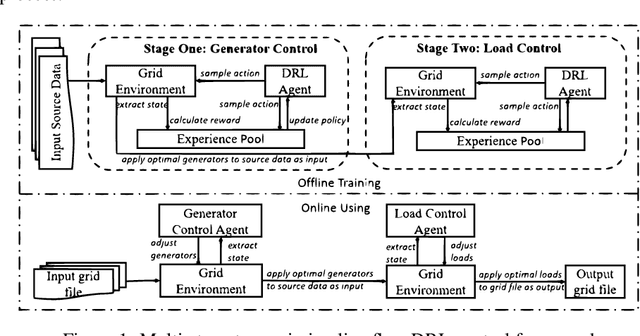Bingquan Zhu
Multi-Stage Transmission Line Flow Control Using Centralized and Decentralized Reinforcement Learning Agents
Feb 16, 2021


Abstract:Planning future operational scenarios of bulk power systems that meet security and economic constraints typically requires intensive labor efforts in performing massive simulations. To automate this process and relieve engineers' burden, a novel multi-stage control approach is presented in this paper to train centralized and decentralized reinforcement learning agents that can automatically adjust grid controllers for regulating transmission line flows at normal condition and under contingencies. The power grid flow control problem is formulated as Markov Decision Process (MDP). At stage one, centralized soft actor-critic (SAC) agent is trained to control generator active power outputs in a wide area to control transmission line flows against specified security limits. If line overloading issues remain unresolved, stage two is used to train decentralized SAC agent via load throw-over at local substations. The effectiveness of the proposed approach is verified on a series of actual planning cases used for operating the power grid of SGCC Zhejiang Electric Power Company.
Deepfakes for Medical Video De-Identification: Privacy Protection and Diagnostic Information Preservation
Feb 07, 2020



Abstract:Data sharing for medical research has been difficult as open-sourcing clinical data may violate patient privacy. Traditional methods for face de-identification wipe out facial information entirely, making it impossible to analyze facial behavior. Recent advancements on whole-body keypoints detection also rely on facial input to estimate body keypoints. Both facial and body keypoints are critical in some medical diagnoses, and keypoints invariability after de-identification is of great importance. Here, we propose a solution using deepfake technology, the face swapping technique. While this swapping method has been criticized for invading privacy and portraiture right, it could conversely protect privacy in medical video: patients' faces could be swapped to a proper target face and become unrecognizable. However, it remained an open question that to what extent the swapping de-identification method could affect the automatic detection of body keypoints. In this study, we apply deepfake technology to Parkinson's disease examination videos to de-identify subjects, and quantitatively show that: face-swapping as a de-identification approach is reliable, and it keeps the keypoints almost invariant, significantly better than traditional methods. This study proposes a pipeline for video de-identification and keypoint preservation, clearing up some ethical restrictions for medical data sharing. This work could make open-source high quality medical video datasets more feasible and promote future medical research that benefits our society.
 Add to Chrome
Add to Chrome Add to Firefox
Add to Firefox Add to Edge
Add to Edge